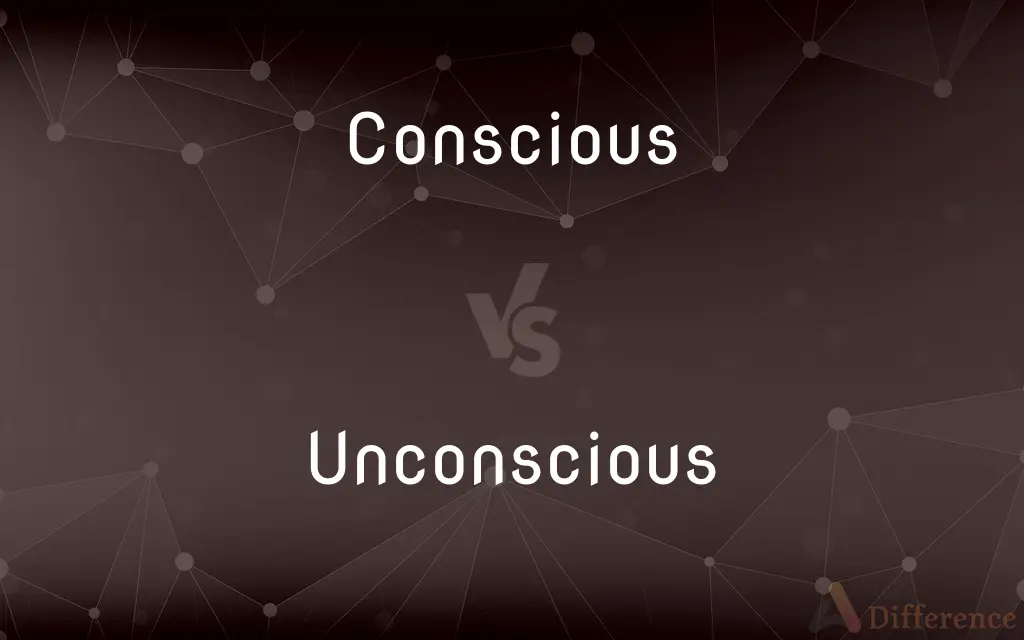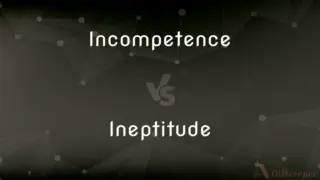Conscious vs. Unconscious — What's the Difference?
Edited by Tayyaba Rehman — By Fiza Rafique — Updated on September 28, 2023
Conscious refers to being aware and responsive, while unconscious means lacking awareness, often due to sleep or injury.

Difference Between Conscious and Unconscious
Table of Contents
ADVERTISEMENT
Key Differences
Conscious and unconscious are contrasting terms often utilized in psychology and everyday language. While being conscious implies active awareness of one's surroundings and thoughts, being unconscious denotes a lack or absence of such awareness.
The realm of the conscious encompasses deliberate actions, thoughts, and feelings. For example, choosing to lift a glass of water demonstrates conscious intent. On the other hand, unconscious actions are those that happen without our deliberate intent, such as breathing or blinking.
Notably, the conscious mind deals with immediate tasks, logical reasoning, and active thought processes. It's our alert state, where decisions are made. Conversely, the unconscious mind houses memories, desires, and feelings that might not be immediately accessible but influence behavior and emotions.
Delving into the nuances, while conscious experiences are those we can verbally describe and recount, unconscious ones might manifest in more subtle ways. Dreams, for instance, are believed by some to be a window into the unconscious.
In therapeutic contexts, such as psychotherapy, the distinction is paramount. Therapists might aim to bring unconscious thoughts to the conscious realm to aid understanding and healing.
ADVERTISEMENT
Comparison Chart
Definition
Aware and responsive
Lacking awareness
Psychological Role
Active thought processes, decision making
Houses memories, desires not immediately known
Accessibility
Directly accessible
Not always directly accessible
Common Examples
Making a choice, problem-solving
Breathing, suppressed memories
Therapeutic Importance
Direct discussions, cognitive therapies
Psychoanalysis, dream analysis
Compare with Definitions
Conscious
Pertaining to immediate awareness.
The topic remained in his conscious mind all day.
Unconscious
In psychology, the part of the mind with memories and desires not currently in awareness.
The therapist delved into her unconscious to understand her fears.
Conscious
Aware of one's surroundings and thoughts.
She was fully conscious of the decision she had to make.
Unconscious
Pertaining to thoughts or feelings unknown to the conscious mind.
Her fear of heights was rooted in an unconscious childhood memory.
Conscious
Deliberate and intentional.
It was a conscious choice to pursue that career.
Unconscious
Not deliberate.
His unconscious habit was tapping his foot when nervous.
Conscious
Having knowledge of something.
He was conscious of the consequences of his actions.
Unconscious
Not awake and aware of and responding to one's environment
The boy was beaten unconscious
Conscious
Mentally perceptive and alert.
Stay conscious of your surroundings while hiking.
Unconscious
Done or existing without one realizing
He would wipe back his hair in an unconscious gesture of annoyance
Conscious
Aware of and responding to one's surroundings
Although I was in pain, I was conscious
Unconscious
The part of the mind which is inaccessible to the conscious mind but which affects behaviour and emotions
Horrific apparitions surfaced out of the recesses of his unconscious
Conscious
Having knowledge of something
We are conscious of the extent of the problem
Unconscious
Lacking awareness and the capacity for sensory perception; not conscious.
Conscious
(of an action or feeling) deliberate and intentional
A conscious effort to walk properly
Unconscious
Temporarily lacking consciousness.
Conscious
Characterized by or having an awareness of one's environment and one's own existence, sensations, and thoughts.
Unconscious
Occurring in the absence of conscious awareness or thought
Unconscious resentment.
Unconscious fears.
Conscious
Mentally perceptive or alert; awake
The patient remained fully conscious after the local anesthetic was administered.
Unconscious
Without conscious control; involuntary or unintended
An unconscious mannerism.
Conscious
Capable of thought, will, or perception
The development of conscious life on the planet.
Unconscious
The division of the mind in psychoanalytic theory containing elements of psychic makeup, such as memories or repressed desires, that are not subject to conscious perception or control but that often affect conscious thoughts and behavior.
Conscious
Subjectively known or felt
Conscious remorse.
Unconscious
Not awake; having no awareness.
After the anesthetist administered the general anesthetic the patient was unconscious.
Conscious
Intentionally conceived or done; deliberate
A conscious insult.
Made a conscious effort to speak more clearly.
Unconscious
(psychology) Without directed thought or awareness.
My sudden fright was an unconscious response.
Conscious
Inwardly attentive or sensitive to something
As he spoke, he became increasingly conscious of his high-pitched voice.
Unconscious
(sports) engaged in skilled performance without conscious control.
Conscious
Showing awareness of or preoccupation with something. Often used in combination
A cost-conscious approach to health care.
A value-conscious shopper.
Unconscious
(psychology) That part of mind that is not consciously perceived.
Conscious
In psychoanalysis, the component of waking awareness perceptible by a person at any given instant; consciousness.
Unconscious
Not conscious; having no consciousness or power of mental perception; without cerebral appreciation; hence, not knowing or regarding; ignorant; as, an unconscious man.
Conscious
Alert, awake; with one's mental faculties active.
The noise woke me, but it was another few minutes before I was fully conscious.
Unconscious
Not known or apprehended by consciousness; resulting from neural activity of which a person is not aware; as, an unconscious movement; unconscious cerebration.
Conscious
Aware of one's own existence; aware of one's own awareness.
Only highly intelligent beings can be fully conscious.
Unconscious
Having no knowledge by experience; - followed by of; as, a mule unconscious of the yoke.
Conscious
Aware of, sensitive to; observing and noticing, or being strongly interested in or concerned about.
I was conscious of a noise behind me.
A very class-conscious analysis
Unconscious
Unintentional; as, an unconscious insult.
Conscious
Deliberate, intentional, done with awareness of what one is doing.
Unconscious
Usually the unconscious; that part of the mind in which mental processes occur that are not accesible to the awareness, but may significantly influence behavior.
Conscious
Known or felt personally, internally by a person.
Conscious guilt
Unconscious
That part of the mind wherein psychic activity takes place of which the person is unaware
Conscious
(rare) Self-conscious, or aware of wrongdoing, feeling guilty.
Passage=They found Aunt Carrol with the old lady, both absorbed in some very interesting subject ; but they dropped it as the girls came in, with a conscious look which betrayed that they had been talking about their nieces.
Unconscious
Not conscious; lacking awareness and the capacity for sensory perception as if asleep or dead;
Lay unconscious on the floor
Conscious
The part of the mind that is aware of itself; the consciousness.
Unconscious
Without conscious volition
Conscious
Possessing the faculty of knowing one's own thoughts or mental operations.
Some are thinking or conscious beings, or have a power of thought.
Unconscious
(followed by `of') not knowing or perceiving;
Happily unconscious of the new calamity at home
Conscious
Possessing knowledge, whether by internal, conscious experience or by external observation; cognizant; aware; sensible.
Her conscious heart imputed suspicion where none could have been felt.
The man who breathes most healthilly is least conscious of his own breathing.
Unconscious
Lacking awareness, often due to sleep or injury.
After the accident, he was unconscious for a few minutes.
Conscious
Made the object of consciousness; known to one's self; as, conscious guilt.
With conscious terrors vex me round.
Unconscious
Being unaware or not noticing something.
He was unconscious of the stain on his shirt.
Conscious
Intentionally conceived;
A conscious effort to speak more slowly
A conscious policy
Conscious
Knowing and perceiving; having awareness of surroundings and sensations and thoughts;
Remained conscious during the operation
Conscious of his faults
Became conscious that he was being followed
Conscious
(followed by `of') showing realization or recognition of something;
Few voters seem conscious of the issue's importance
Conscious of having succeeded
The careful tread of one conscious of his alcoholic load
Common Curiosities
Is the unconscious mind always hidden?
Not necessarily; sometimes unconscious thoughts can influence behavior without one realizing.
Can we control our unconscious mind?
It's not directly controllable, but therapy and reflection can bring aspects to the conscious forefront.
Do Conscious and Unconscious only relate to psychology?
Primarily, but they're also used in everyday language to describe awareness levels.
Does the unconscious mind store all memories?
It's believed to store many, especially those not immediately recalled by the conscious mind.
Are gut feelings a product of the unconscious?
Often, yes. Gut feelings can arise from unconscious evaluations based on past experiences.
Are dreams considered a part of the unconscious?
Many believe dreams tap into the unconscious, revealing hidden feelings or desires.
Is being conscious the same as being awake?
Mostly, yes, but one can be awake and not fully conscious, like in a daze.
What happens when unconscious thoughts become conscious?
They can be understood, processed, and potentially addressed or integrated.
Can unconscious actions be modified?
Yes, with awareness and practice, one can modify behaviors stemming from the unconscious.
How do therapists access the unconscious in patients?
Techniques like dream analysis, free association, or hypnotherapy can access the unconscious.
Is the unconscious mind always at rest?
No, it's constantly processing, even when one's conscious mind is focused elsewhere.
Is meditation a way to access the unconscious?
Meditation can help in understanding deeper feelings, potentially tapping into the unconscious.
Is intuition linked to the unconscious?
Yes, intuition often stems from unconscious evaluations or patterns recognized by the brain.
Can art or music access the unconscious?
Many believe art and music can evoke deep, often unconscious, emotions and memories.
Can being conscious of something alter behavior?
Absolutely. Conscious awareness often leads to deliberate choices and actions.
Share Your Discovery

Previous Comparison
Class vs. Workshop
Next Comparison
Incompetence vs. IneptitudeAuthor Spotlight
Written by
Fiza RafiqueFiza Rafique is a skilled content writer at AskDifference.com, where she meticulously refines and enhances written pieces. Drawing from her vast editorial expertise, Fiza ensures clarity, accuracy, and precision in every article. Passionate about language, she continually seeks to elevate the quality of content for readers worldwide.
Edited by
Tayyaba RehmanTayyaba Rehman is a distinguished writer, currently serving as a primary contributor to askdifference.com. As a researcher in semantics and etymology, Tayyaba's passion for the complexity of languages and their distinctions has found a perfect home on the platform. Tayyaba delves into the intricacies of language, distinguishing between commonly confused words and phrases, thereby providing clarity for readers worldwide.
















































